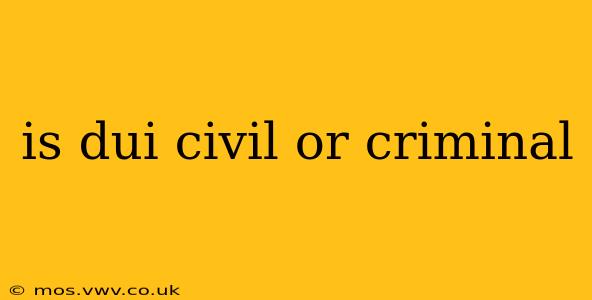A DUI (Driving Under the Influence) or DWI (Driving While Intoxicated) charge carries significant weight, impacting far more than just your driving privileges. The crucial question many face is: is a DUI civil or criminal? The answer is nuanced: it's both. A DUI involves both civil and criminal consequences, each with its own set of repercussions.
Is a DUI a Criminal Offense?
Yes, overwhelmingly, a DUI is considered a criminal offense. This means you're facing charges from the state or the relevant jurisdiction, potentially resulting in fines, jail time, probation, and a criminal record. The severity of the criminal penalties varies depending on factors such as:
- Blood Alcohol Content (BAC): Higher BAC levels typically lead to harsher penalties.
- Prior DUI Convictions: Repeat offenses result in significantly increased penalties.
- Aggravating Circumstances: Things like accidents involving injury or death drastically increase the seriousness of the charges.
- State Laws: Penalties for DUIs vary significantly from state to state.
The criminal aspect of a DUI involves the state prosecuting you for violating laws designed to protect public safety. This process follows established legal procedures, including arrest, arraignment, potential plea bargaining, and trial.
Does a DUI Have Civil Consequences?
Beyond the criminal repercussions, a DUI also triggers civil liabilities. These are separate from the criminal charges and involve potential lawsuits from individuals harmed by your actions. For example:
- Personal Injury Lawsuits: If you cause an accident resulting in injuries to others, victims can sue you for medical expenses, lost wages, pain and suffering, and other damages.
- Property Damage Lawsuits: Similarly, if your DUI results in property damage, the owners of the damaged property can sue you for repair or replacement costs.
- Insurance Claims: Your insurance company may deny coverage or increase your premiums significantly following a DUI conviction. They might even pursue reimbursement for payouts they made to others involved in the accident.
How are Civil and Criminal DUI Cases Different?
It's important to understand the distinction:
- Burden of Proof: In criminal cases, the prosecution must prove your guilt beyond a reasonable doubt. In civil cases, the plaintiff (the person suing you) only needs to prove your negligence by a preponderance of the evidence. This lower standard makes it easier to win a civil suit.
- Consequences: Criminal penalties focus on punishment and deterrence. Civil penalties aim to compensate victims for their losses.
- Separate Proceedings: Criminal and civil cases are handled separately. You can be found guilty in a criminal DUI case and still be sued in a civil case.
What Happens if I Refuse a Breathalyzer Test?
Refusing a breathalyzer or blood test can have serious consequences, both criminally and civilly. While it protects against self-incrimination in the criminal case (you can't be forced to testify against yourself), many states have implied consent laws. These laws state that by driving, you've implicitly consented to chemical testing. Refusal can lead to license suspension and potentially harsher penalties in court. It also strengthens the case against you in a potential civil lawsuit.
Can I Get My Driving Privileges Back After a DUI?
Reinstating your driving privileges after a DUI conviction typically involves completing specific requirements, such as:
- License Suspension Period: Serving the mandatory suspension period set by your state.
- DUI Classes or Programs: Completing alcohol education or treatment programs.
- Ignition Interlock Device (IID): Installing a breathalyzer in your vehicle to prevent driving while intoxicated.
- Re-examination: Passing a driving test.
The process and requirements vary widely from state to state, making it crucial to consult with an attorney and the relevant Department of Motor Vehicles.
In conclusion, a DUI is not simply a traffic violation; it's a serious matter with far-reaching consequences. Understanding both the criminal and civil ramifications is vital to protecting yourself and navigating the legal challenges that follow. Seeking legal counsel immediately after a DUI arrest is strongly recommended.
